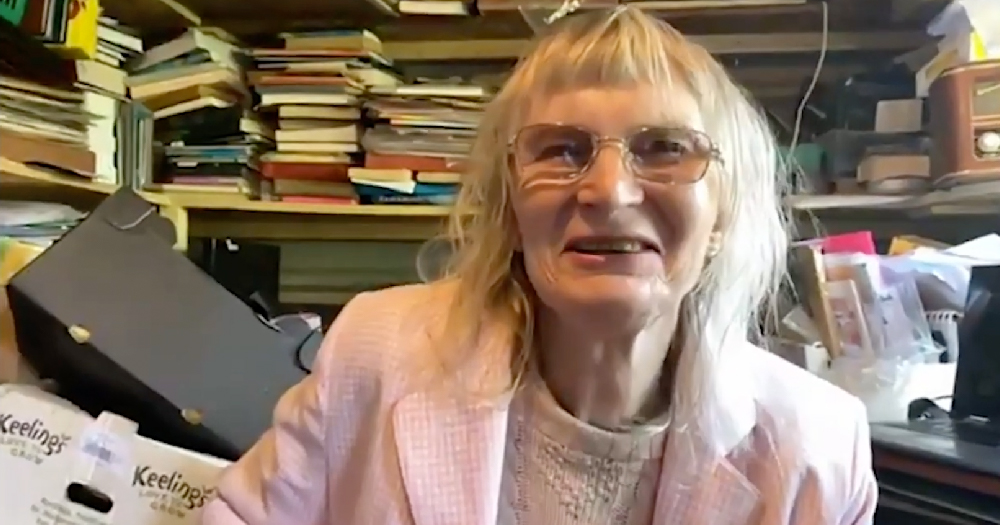In 2015, Dr Lydia Foy became the first trans person to be recognised under the newly implemented Gender Recognition Act. However, this achievement did not come without struggle, and Foy described her journey to ShoutOut in the latest episode of Know Your Queer History.
Born in 1947, Dr Lydia Foy had sex reassignment surgery in 1992, and during the following year applied to have her birth certificate legally changed, a request which was denied. Thus commenced a twenty-year battle for gender recognition, and the hostility she faced in response to her bravery, caused her to feel “as a lot of people in the family law courts did”, which was “brutalised” and alone.
Foy continued battling the courts for her rights, but it seemed the more she fought, the more she lost.
“I tried to get some form of redress, or some form of answer while they kept on taking my rights away, and to no avail. So I lost my home and my family and job and everything.”
She had been left disheartened and disgusted, but not defeated. After parting ways with the legal aid board who she said “made matters worse by the minute”, Foy turned to FLAC (Free Legal Advice Centre) who offered her support that she remains grateful for to this day. Through the organisation she achieved the right of reply, meaning she could defend herself against public criticism in the same place it was published, which she admits gave her the courage to “try and keep up the good fight”.
The fight in question caused her to sacrifice everything she had, even if it was only just “a hovel of an old broken down house.”
In 2002, she lost another case following an array of medical and psychological assessments such as blood tests, a vaginal ultrasound, psychiatrist evaluations, etc. “I don’t know where I got the stamina,” she admits to host Domhnaill Harkin.
“At that stage, you get so annoyed I suppose that you say, ‘well, I’m going to keep going because this is just not right’.”
“And at that stage, of course, it was getting bigger than me,” she added, as more and more people were beginning to struggle for the same recognition. “So the case became much more than me just looking for a birth cert.”
The Irish State continued to be uncooperative, and non-compliant with EU regulations, so Foy’s next step was to take matters to the High Court in 2007. By this stage, she admits she “got exhausted”, but once again continued fighting for “everyone who was being bashed” by newspapers, the church, and the state.
It wasn’t until 2015 that the Gender Recognition Act was passed, with the first cert being saved for none other than Dr Lydia Foy. Upon receiving this landmark ruling, she admits she was “delighted, but again, very, very tired, and just hoping that the final bits would be enacted properly.”
Her perseverance paved the way for trans folk in Ireland today, and although there is clearly still a lot to be done to achieve equality, her ShoutOut interview proves that anything is possible. From becoming the first trans person to receive the Citizen’s Prize from the European Parliament, to meeting Joe Biden while he was Vice President in the Obama Administration, Foy has solidified herself as an inspiration and an icon for activists worldwide.
Irish academic and LGBTQ+ campaigner, Ailbhe Smyth, also recently made an appearance on the ShoutOut interview series. She joined the women’s rights and gay rights movements in the ‘70s and ‘80s, explaining that “A lot of us crossed between the two”, and has been instrumental in enforcing change in both ever since.
The state of LGBTQ+ rights during that time is pinpointed through the brutal murder of Declan Flynn, followed by the suspended sentence that the assailants faced. Smyth remembers that troubling time, stating that “We still have homophobia, but this was something… This was another planet. We were completely invisible.”
Throughout the interview, she touches on a variety of fascinating topics, including working with GCN, introducing the Lesbian Lives conference, taking a stand against trans exclusionists, and of course, fighting for marriage equality. She says she “was known as a feminist lesbian radical”, which was “not a good thing to be known as in polite society!”
“I’m astonished at how brave we were,” she confesses to Harkin.
Know Your Queer History, a series from LGBTQ+ education charity ShoutOut, features interviews with 12 trailblazing individuals instrumental in securing equality in Ireland. You can watch it on ShoutOut’s Facebook, YouTube, and Instagram channels.
© 2021 GCN (Gay Community News). All rights reserved.
Support GCN
GCN is a free, vital resource for Ireland’s LGBTQ+ community since 1988.
GCN is a trading name of National LGBT Federation CLG, a registered charity - Charity Number: 20034580.
GCN relies on the generous support of the community and allies to sustain the crucial work that we do. Producing GCN is costly, and, in an industry which has been hugely impacted by rising costs, we need your support to help sustain and grow this vital resource.
Supporting GCN for as little as €1.99 per month will help us continue our work as Ireland’s free, independent LGBTQ+ media.
